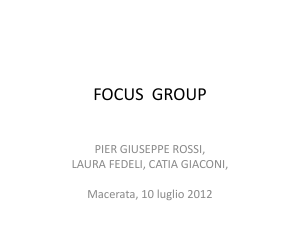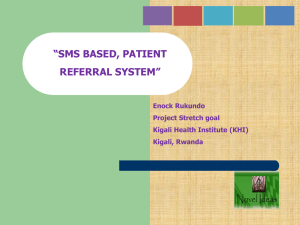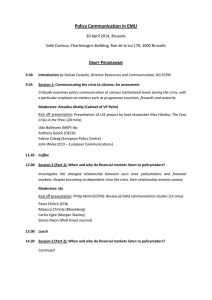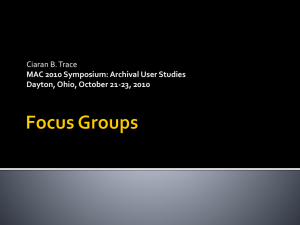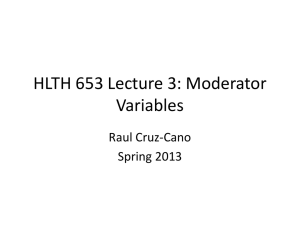- (EPD) Evidence-Based Healthcare Professional
advertisement
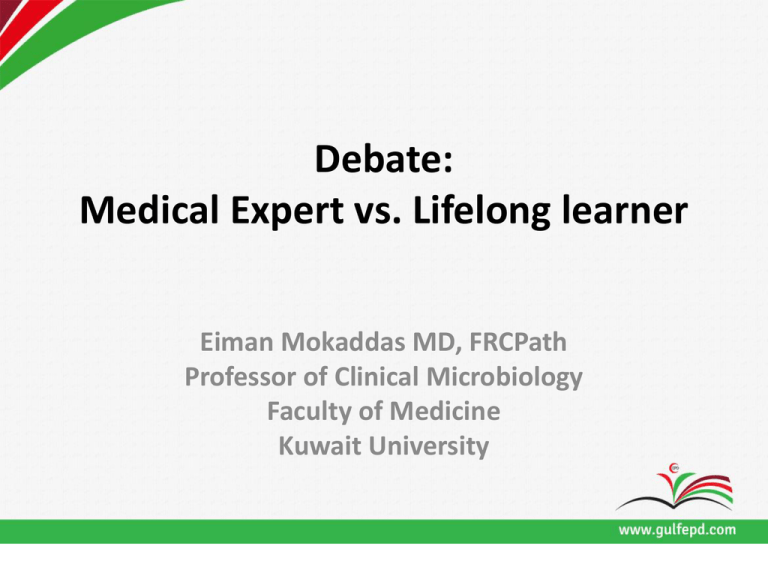
Debate: Medical Expert vs. Lifelong learner Eiman Mokaddas MD, FRCPath Professor of Clinical Microbiology Faculty of Medicine Kuwait University Structured curriculum Medical Expert Case Medical Student 1st Clinical Year ( year 5) Phase III MSD Diabetic Foot Infection • History • Clinical Examination • Diagnosis Lab Diagnosis • Wound was sent for culture • Wound culture result: – Pseudomonas aeruginosa – MRSA Moderator (Microbiologist) • What type of bacteria is Pseudomonas aeruginosa? Student • Pleaaaaaaaaase Dr. Eiman tomorrow don’t ask me this question because I don’t know the answer. Case (cont.) • Treatment of Diabetic foot infection due to Pseudomonas aeruginosa: – Ertapenemn – Ciprofloxacin – Tobramycin Moderator • What is ertapenem? Student • Pleaaaaaaaaaase Dr. Eiman don’t ask me this question tomorrow, I have searched in the internet and got this list Moderator • What group of antibiotics is ciprofloxacin? Student • Pleaaaaaaaaaaase Dr. Eiman don’t ask me this question tomorrow as I don’t know the answer Moderator • Moderator’s Blood pressure: – 200/110 • Fortunately no hard stuff in front of the moderator (no Comment) Case 2nd Medical Student pre-clinical Year ( year 4) Phase II Final Exam Oral exam To be upgraded fro B+ to A i.e. Distinction Examiner Microbiologist • What are the causes of pneumonia? Student • • • • • • • Staphylococcus aureus Streptococcus epidermidis Mycoplasma tuberculosis ------------------------- Moderator What else? • • • • Dr. We took respiratory system in year 3 I studied for year 4 systems I forgot the respiratory system Pleaaaaase ask me about GI system Moderator • OK What are the bacterial causes of gastroenteritis? Student • Salmonella • Shigella Moderator • Good • What type of bacteria is salmonella? Student • Gram-negative bacilli Moderator • Good • What media do you use to culture it in the lab? Student • No answer • Sorry Dr. Eiman I cannot remember Moderator • Did you hear about MacConkey agar? Student • Yes Yes Yes Moderator • What type of colonies do salmonella produce on MacConkey agar? Student • No Answer • I cannot remember Dr. Case 4th Year Medical student Old curriculum Final Exam Oral exam To be upgraded fro A- to A i.e. Distinction External Examiner from (UK) Microbiologist • What are the causes of pneumonia? Student • • • • Viral Bacteria Fungal Protozoa Student • Bacterial – S.pneumoniae – Haemophilus influenzae – Mycoplasma pneumonia – Chlamydia pneumoniae – Chlamydia psitacii – Legionella penumophila Knowledge External Examiner from (UK) Microbiologist • What other infection does S.pneumoniae cause? Student • • • • Bacterial meningitis Otitis media Sinusitis Peritonitis Integration External Examiner from (UK) Microbiologist • How do you culture S.pneumoniae in the lab? Student • • • • On Blood agar Colonies are α hemolytic Optichin sensitive Bile soluble External Examiner from (UK) Microbiologist • How can we prevent pneumococcal meningitis? Student • 23-polysaccharide pneumococcal vaccine • Conjugate vaccine: New What is this called??? Structure-based Lifelong learning Life long learning Integrated System • • • • Total No. of deliveries as Microbiology & Immunology Contributions A total of 34 lecture A total of 16 seminar (small group teaching) A total of 9 learning topics A total of 2 lab practicals Over 3 years Phase II Structured Curriculum Old Curriculum • • • • • • • Microbiology Contribution 4th Year 200 deliveries General Microbiology Immunology Systematic bacteriology Virology Parasitology Mycology Integrated systems Microbiology Contribution 5th Year 20 deliveries • Clinical Microbiology Course Problem-based ( integrated system) Most of the medical schools • An average per week of: – 3-5 hrs PBL sessions – 12-15 hrs lectures – 3-5 small group sessions Problem-based ( integrated system) FOM, Kuwait University • An average per week of: – 3-5 hrs PBL sessions – 5-6 hrs lectures – 2-3 small group sessions Rest of the time is self learning Integrated curriculum Structured Curriculum Neither Knowledge Medical Expert Lifelong learning Structured curriculum Each subject has an exam If Fail Microbiology Cannot pass the final exam Integrated (problem-based curriculum) curriculum One Exam Can skip the whole Microbiology The whole Physiology Still can pass the exam What is the end result? Very weak in managing infectious diseases What could be the solution Back to structured curriculum??? More control on marking the integrated exam with minimum marks for pass in all disciplines Any Difference in post graduate performance between the 2 types of curricula? Need real comparative figures Two collegues: One consultant physician One consultant pediatrician We do have problems with the new system They do not pass USMLE Exams Literature search Knowledge Structured curriculum You don’t know what you don’t know Learning knowledge Not the same Learning how to use knowledge Medical Expert skill is a choice not a talent Both are needed Talent gets you in the game but it can’t make you an expert Medical Expert skill = If either zero, it’s all zero Performance X Professionalism Grades If I were asked to enumerate ten educational stupidities, the giving of grades would head the list. If I can’t give the student a better reason for studying than a grade on a report card, I aught to lock my desck, go home and stay there. “The wound is mortal” By De Zouche (1945) Motivation to achieve enjoyment and enthusiasm is vital to excel the medical expert associated with knowledge, rather than making reluctant effort simply to be suscessful when assessed. Ainly, 2006 Conclusion Medical school is not only about the core science requirements but about the development of the individual as a competent, compassionate and well informed physician upon graduation Integrating a curriculum is a complex process Not everything that counts can be counted Albert Einstein The Brain is: (A work in Progress) Need both Knowledge and creativity In order not to stop This can be only achieved by Enjoyment Enjoyment Lifelong learning Thank you
